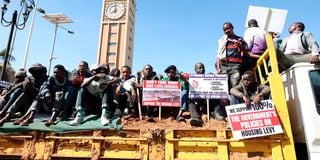Premium
Court deals blow to Ruto’s Affordable Housing Bill

Jua Kali sector workers demonstrate outside Parliament Buildings in Nairobi yesterday in support of the Housing Levy.
What you need to know:
- The National Assembly had set Thursday, December 28, 2023 as the deadline to receive memoranda on the Bill.
- President Ruto has been a vocal advocate of the Housing levy and has condemned those who have gone to the courts to stop the implementation of the fund.
President William Ruto’s Affordable Housing Bill, 2023, suffered a second blow after the High Court stopped the planned public participation pending inter-parties hearing.
Justice Jacqueline Kamau of the Vihiga High Court on Wednesday declined to vacate the orders and instead asked the parties to make submissions for hearing on January 17, 2024.
The National Assembly had set Thursday, December 28, 2023 as the deadline to receive memoranda on the Bill.
On November 28, Justices David Majanja, Christine Meoli and Lawrence Mugambi declared the Housing Levy unconstitutional and its continued implementation a contravention of the constitution. The court, however, allowed the government to continue collecting the levy until January 10 when the case will be mentioned.
The High Court in Kisumu had issued conservatory orders stopping the intended public participation on the Affordable Housing Bill, 2023 pending further directions.
Justice Kamau directed the parties to make submissions by January 15 for inter-parties hearing before the Kisumu High Court on January 17.
A Kisumu-based lobby, Grassroots Trust, went to court under a certificate of urgency seeking to halt the process on grounds that the notice given was too short considering the nature of the Bill and its importance. The petitioner said the National Assembly should conduct adequate public participation, especially targeting marginalised groups, that may not know the content of the Bill.
Through lawyer Paul Ogendi, the lobby listed the Attorney-General as the 1st respondent, Cabinet secretary for Lands, Public Works, Housing and Urban Development as the 2nd respondent and the National Assembly the 3rd respondent.
Lawyer Lawson Ondieki, representing the AG, and Kiragu Kimani representing the Lands CS, urged the court to lift the orders to allow the public participation to continue.
Mr Ondieki argued that stopping public participation was denying Kenyans an opportunity to give their views on the Bill.
But his request to lift the orders was opposed by Dr Ogendi, arguing that the National Assembly failed to give adequate time and ensur eeffective public participation.
On December 7, the government through National Assembly Leader of Majority Kimani Ichung’wah, tabled a revised Affordable Housing Bill seeking to regularise illegalities pointed out by the High Court.
The Bill, which already went through the First Reading, also seeks to establish a board to manage the fund. It has retained the 1.5 per cent deductions from employees’ salaries and an additional 1.5 per cent from the employers.
At the same time, Jua Kali workers have said they risk losing their jobs after the High Court declared the implementation of the Housing Levy unconstitutional.
According to Jua Kali Contractors Federation of Kenya chairperson Peter Muema, the workers currently involved in affordable housing construction projects across the country will have no jobs should the courts lift the stay orders on January 10,2024.
“We respect the court but our question is where will all these workers go if the court suspends the housing fund levy? All these people will go hungry and go back to crime. As construction workers, we want the houses and we want our children to go to school. We want to get out of the slums and move into decent housing,” Mr Muema said.
“We have plumbers and suppliers who are already on the projects across the country. The sites have been identified in different counties and as construction workers we are ready to work,” he added.
The construction workers were speaking after holding a series of demonstrations in support of the levy in Nairobi yesterday.
During the demonstrations, the workers also called upon petitioners, including Busia Senator Okiya Omtatah, to drop the petition challenging the implementation of the levy.
In its ruling, the High Court said the levy is discriminatory as it only targets Kenyans in formal employment, leaving out 15.9 million others in the informal sector.
President William Ruto has been a vocal advocate of the Housing levy and has condemned those who have gone to the courts to stop the implementation of the fund.






